Muted levels of construction activity since the 2011 revolution, combined with constraints on electricity supply, has stifled operating conditions for Egypt’s cement producers, though new projects scheduled to launch in the second half of 2014 could provide a helpful boost to the segment, recently buoyed by the successful IPO of Arabian Cement.
The IPO, the first in Egypt for four years, of the local cement producer was 18.5 times oversubscribed after 85m shares were sold worth $110m. This emphasized the performance of the country’s capital markets in recent months, with the main index rising by more than 70% over the past year.
The large subscription for shares in Arabian Cement, in which Spanish firm Cementos La Union holds the largest stake, not only reflects the latent demand for new Egyptian stock offerings, but may also herald a much-needed turnaround in fortunes for the broader building materials sector.
Navigating challenges
Output in the building materials industry has been impacted by the turbulence with public spending on construction and infrastructure activity declining. The value of investments in the sector fell by 71% in 2012 according to data by the Central Bank, cited in a report by Bank Audi from March this year.
Private investments in new residential and commercial property development have also dwindled, albeit to a lesser extent. Rents for the best Cairo offices fell to $40 per square meter per month in 2013 from $50 since 2009 while retail rents have plunged to $100 per square meter per month from $150, according to data from real estate consultant Knight Frank.
But things are starting to improve. Construction and building activity grew by 6% in 2013 with construction expenditure standing at $6.2bn according to the Bank Audi report. It is expected to rise to $7.3bn in 2015.
In a bid to revive the flagging economy, the interim government has pledged to pump money into construction, particularly targeting mothballed infrastructure projects and low-cost housing, as part of a $4.3bn stimulus package. With a focus on job-creation through the activation of projects in the public sector, the government is also hoping to spur growth in the private sector.
Gas flow
But another problem remains. Inadequate supplies of natural gas are impacting the ability of producers to maintain output. Balancing rising domestic consumption with export commitments has been a challenge for Egypt’s gas sector in recent years and in May, a number of cement firms were forced to stop production after the Egyptian Natural Gas Holding Company (EGAS) halted the flow of gas to 10 plants, which account for more than two-thirds of the industry’s output, to ensure sufficient supply elsewhere on the grid.
Supplies to the sector, which obtains gas from state-owned EGAS at a subsidized rate, had already been scaled back by 35% at the start of 2014 as the government sought to balance industrial needs and power stations’ gas requirements, while also moving to increase prices nearer market rates.
Sector canvassing fuelling options, weighing costs
However, there may be a silver lining as the restricted supply is encouraging producers to diversify their energy sources to keep their kilns operating.
One of these alternatives will be coal, with the government easing restrictions on imports of the fuel in April. There have been objections to the plan to import coal although the government has said the ongoing outages in power supplies to the public warrant both cutting gas flows to industry and allowing coal to be used for industrial purposes and to generate power.
Suez Cement announced at the end of April that it would be shifting to a fuel mix comprising 80% coal and 20% waste material. Another firm, Misr Beni Suef Cement Company, has announced it will be using diesel to keep at least one of its production lines operating, after being informed by the state that gas supplies would be suspended throughout May.
Bruno Carre, Suez’s managing director, agrees that all Egyptians, citizens and companies must help reduce their energy consumption but the process will take time. “Companies, like cement producers, must also diversify their energy mix as was recently approved by the Cabinet. But this will take some time to implement during which cement production will continue to be constrained and costly imported cement products will be necessary,” he told OBG.
Oxford Business Group
2 July























































